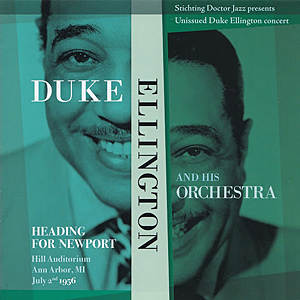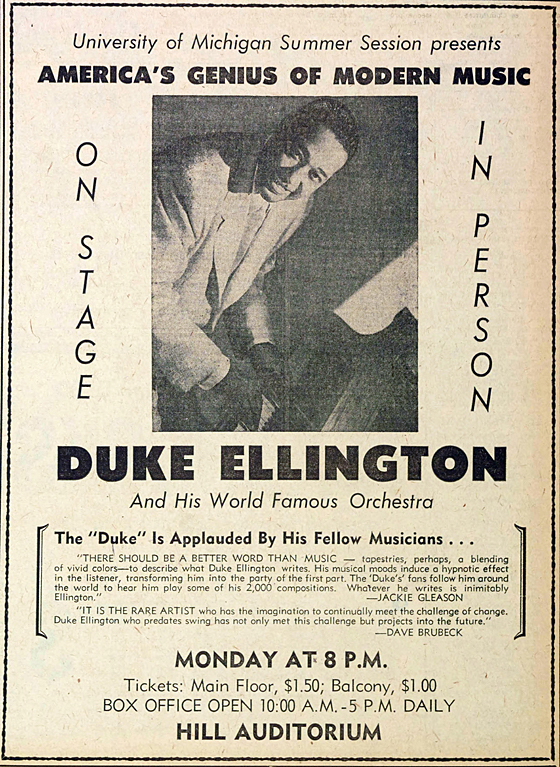The Duke in Ann Arbor,
July 2, 1956
The year 1956 was a breakthrough one for Duke Ellington; famously, he claimed to have been reborn on July 7 at the Newport Jazz Festival when he let saxophonist Paul Gonsalves loose on 27 choruses of “Diminuendo and Crescendo in Blue.”
But before he arrived in Newport, the Duke was touring the country, playing dances and concerts on an almost nightly basis and his last two stops were in Ann Arbor at Hill Auditorium on Monday, July 2, and on Wednesday, July 4, at the State Fairgrounds in Detroit (soon to be razed for an Amazon complex), before heading to New York and off to Rhode Island for the festival.
 Ellington had played in the area before on many occasions, including two nights at the Michigan Theatre in 1940. Earlier in 1956, his band played in Ann Arbor at the Michigan League Ballroom for the annual ROTC Military Ball in March. Intermission entertainment was to “include the Coutures, a singing combo, a chalk talk by John Collins and Dick Phillips and drill team exhibition by the Pershing Riflemen, a precision drill team.” But at 8:00 p.m. on July 2 the Duke played a concert for the first time at the great Hill Auditorium and now, thanks to the Dutch label Doctor Jazz, we can hear a part of what was played that evening, released as Heading to Newport: Hill Auditorium Ann Arbor, MI July 2nd 1956 (DJ 018; www.doctorjazz.nl). Most of the concerts at Hill were recorded, but their fate remains unknown to me. How this one survived remains a mystery; Steve Voce’s otherwise informative album notes give not a hint as to the origins of the recordings. The CD includes 17 tracks; several tunes played that evening, including the dreaded medley of Ellington hits, were not included as the source had deteriorated and they were “not fit to issue.”
Ellington had played in the area before on many occasions, including two nights at the Michigan Theatre in 1940. Earlier in 1956, his band played in Ann Arbor at the Michigan League Ballroom for the annual ROTC Military Ball in March. Intermission entertainment was to “include the Coutures, a singing combo, a chalk talk by John Collins and Dick Phillips and drill team exhibition by the Pershing Riflemen, a precision drill team.” But at 8:00 p.m. on July 2 the Duke played a concert for the first time at the great Hill Auditorium and now, thanks to the Dutch label Doctor Jazz, we can hear a part of what was played that evening, released as Heading to Newport: Hill Auditorium Ann Arbor, MI July 2nd 1956 (DJ 018; www.doctorjazz.nl). Most of the concerts at Hill were recorded, but their fate remains unknown to me. How this one survived remains a mystery; Steve Voce’s otherwise informative album notes give not a hint as to the origins of the recordings. The CD includes 17 tracks; several tunes played that evening, including the dreaded medley of Ellington hits, were not included as the source had deteriorated and they were “not fit to issue.”
The Newport performance has acquired classic status in jazz lore, but the band was in very good shape throughout the year as evidenced by recordings such as the Chicago Studio Sessions, two LPs for Bethlehem and at the end of the year, A Drum is a Woman. The Hill recording is different, documenting the standard repertoire Ellington was playing at the time, similar to what can be heard on previously released concert recordings from the Stratford Festival in Ontario and from Tanglewood a few weeks later. The band is in great form and one can only marvel once again how this often undisciplined group could maintain such high enthusiasm and artistic commitment while constantly on the move and often playing the same arrangements, and even the same or similar solos, night after night. The soloists were all at the top of their game that day. The alto sax master Johnny Hodges, so integral to the orchestra’s tonal palate, who had rejoined the fold a year earlier after a four-year absence, is featured on two Ellington chestnuts, “Prelude to a Kiss” and “Things Ain’t What they Used to Be.” Trumpeter Clark Terry dutifully makes “Harlem Air Shaft” sing, assuming the role originally played by Cootie Williams, but which he had made his own in the early fifties. Most of the other members of the trumpet section likewise take turns, including Cat Anderson on “La Virgen de Macarenna” and “The Hawk Talks,” while Ray Nance does “Satin Doll” and Billy Strayhorn’s “Take the ‘A’ Train,” singing and playing his horn fifteen years after he had soloed on the first recording of the tune. At the time, Ellington would also feature tenor saxophonist Paul Gonsalves on “A Train,” and a second version has him soloing with excitement and verve — not exactly the myriad choruses as on his feature at Newport five days later, but impressively, nonetheless. A spirited “Stomping at the Savoy” featured a series of raucous solos, with Paul Gonsalves on tenor and Russell Procope on alto bringing it home. All in all, this is a very fine example of disciplined Ellingtonia concert playing of the time, complete with the leader’s suave intros, recorded in very fine sound.
The performance was reviewed in the Michigan Daily the next day by a somewhat superior young scribe who clearly wanted to be with it, ending with “I, for one, was carried away by the whole proceeding, and left the hall yelling: Radical, man, radical! It was the mostest.” Time passes….

